Audi Q7 VS Citroen Jumper
Audi Q7
The Audi Q7 combines luxurious comfort with impressive versatility, making it a standout choice in the SUV market. Its sophisticated design and meticulous attention to detail create an elegant yet robust presence on the road. With advanced technology and a focus on safety, the Q7 ensures a premium driving experience for both the driver and passengers.
more informationCitroen Jumper
The Citroen Jumper impresses with its robust design and exceptional versatility, making it a popular choice for both business and leisure purposes. Its spacious interior is thoughtfully designed to maximise comfort and practicality, providing ample room for passengers and cargo alike. With a smooth driving experience and a range of advanced safety features, the Jumper is well-equipped to handle the demands of modern motoring.
more information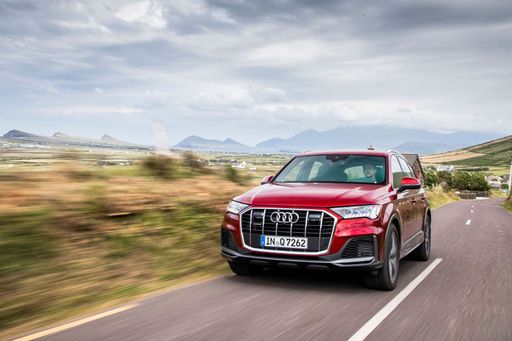 @ audi-mediacenter.com
@ audi-mediacenter.com
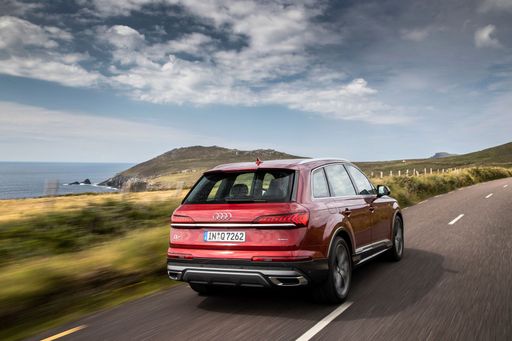 @ audi-mediacenter.com
@ audi-mediacenter.com
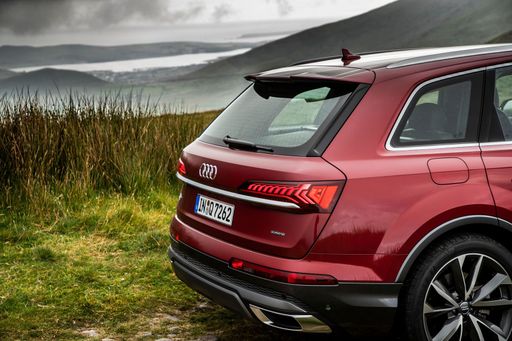 @ audi-mediacenter.com
@ audi-mediacenter.com
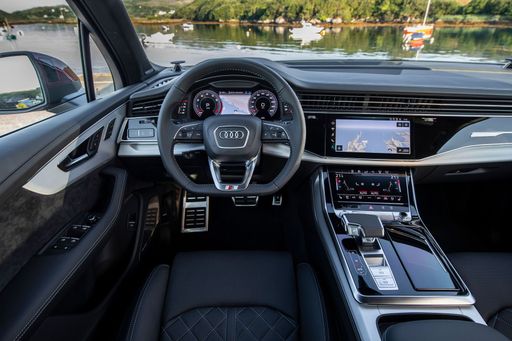 @ audi-mediacenter.com
@ audi-mediacenter.com
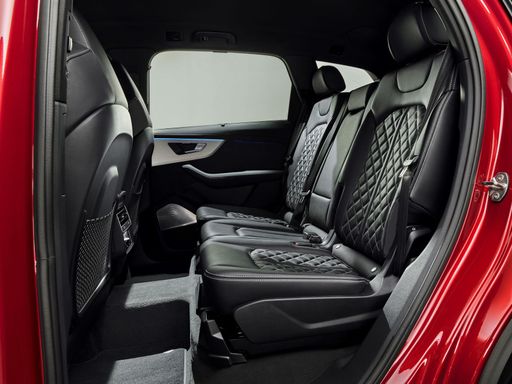 @ audi-mediacenter.com
@ audi-mediacenter.com
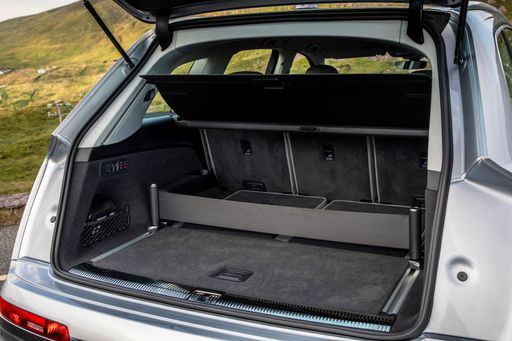 @ audi-mediacenter.com
@ audi-mediacenter.com
Costs and Consumption |
|
|---|---|
|
Price
about 68000 - 97300
£
|
Price
about 55900 - 58700
£
|
|
Consumption L/100km
1.2 - 12
L
|
Consumption L/100km
-
|
|
Consumption kWh/100km
-
|
Consumption kWh/100km
26.2
kWh
|
|
Electric Range
83 - 84
km
|
Electric Range
424
km
|
|
Battery Capacity
22
kWh
|
Battery Capacity
97.8
kWh
|
|
co2
28 - 272
g/km
|
co2
0
g/km
|
|
Fuel tank capacity
75 - 85
L
|
Fuel tank capacity
-
|
Dimensions and Body |
|
|
Body Type
SUV
|
Body Type
Cargo Van
|
|
Seats
5 - 7
|
Seats
3
|
|
Doors
5
|
Doors
4
|
|
Curb weight
2055 - 2460
kg
|
Curb weight
2865 - 2940
kg
|
|
Trunk capacity
563 - 887
L
|
Trunk capacity
-
|
|
Length
5072
mm
|
Length
5998 - 6363
mm
|
|
Width
1970
mm
|
Width
2050
mm
|
|
Height
1703 - 1735
mm
|
Height
2612 - 2850
mm
|
|
Payload
640 - 885
kg
|
Payload
560 - 1385
kg
|
Engine and Performance |
|
|
Engine Type
Diesel MHEV, Plugin Hybrid, Petrol MHEV, Petrol
|
Engine Type
Electric
|
|
Transmission
Automatic
|
Transmission
Automatic
|
|
Transmission Detail
Automatic Gearbox
|
Transmission Detail
Reduction Gearbox
|
|
Drive Type
All-Wheel Drive
|
Drive Type
Front-Wheel Drive
|
|
Power HP
231 - 507
HP
|
Power HP
270
HP
|
|
Acceleration 0-100km/h
4.1 - 7.1
s
|
Acceleration 0-100km/h
-
|
|
Max Speed
226 - 250
km/h
|
Max Speed
90 - 130
km/h
|
|
Torque
500 - 770
Nm
|
Torque
410
Nm
|
|
Number of Cylinders
6 - 8
|
Number of Cylinders
-
|
|
Power kW
170 - 373
kW
|
Power kW
200
kW
|
|
Engine capacity
2967 - 3996
cm3
|
Engine capacity
-
|
|
Top speed
226 - 250
km/h
|
Top speed
90 - 130
km/h
|
General |
|
|
Model Year
2024
|
Model Year
2024
|
|
CO2 Efficiency Class
G, B
|
CO2 Efficiency Class
A
|
|
Brand
Audi
|
Brand
Citroen
|
Audi Q7
Audi Q7: A Benchmark in Automotive Excellence
The Audi Q7 continues to hold its ground as a versatile and luxurious SUV, offering a rich blend of cutting-edge technology, impressive performance, and comfort. With its recent facelift, the Q7 introduces innovative elements that cater to modern-day driving demands. Explore the technical details and unique attributes that make the Audi Q7 a class leader.
Engine Options and Performance
The Audi Q7 is available with a range of engine options designed to suit various needs and preferences. These include Diesel Mild-Hybrid, Plug-in Hybrid, and Petrol Mild-Hybrid configurations. The power output for these engines ranges from 231 to an exhilarating 507 PS, catering to both efficiency seekers and performance enthusiasts. The Audi Q7 can accelerate from 0 to 100 km/h in as little as 4.1 seconds, showcasing its athletic performance.
Innovative Technology Integration
The Audi Q7 integrates the latest technological advancements to enhance the driving experience. The intuitive Audi Virtual Cockpit and a comprehensive infotainment system ensure that the driver remains informed and entertained. The vehicle’s mild-hybrid systems significantly improve fuel efficiency and reduce emissions, highlighting Audi’s commitment to sustainability without sacrificing performance.
Advanced Safety and Driver Assistance
The Q7 is equipped with state-of-the-art safety features and driver assistance systems to ensure peace of mind on the road. Audi Pre Sense, adaptive cruise control, lane-keeping assist, and a 360-degree camera system work seamlessly together to help prevent accidents and enhance the driving experience.
Design and Interior Comfort
With its bold, sophisticated design, the Audi Q7 is both robust and stylish. The SUV offers configurations for five to seven seats, making it adaptable for families and groups. Meticulously crafted materials, adjustable seating, and advanced climate control systems provide a comfortable environment, even on long journeys.
Environmental Efficiency
The Audi Q7’s environmentally conscious engineering includes models with CO2 emissions as low as 28 g/km. For those opting for the Plug-in Hybrid variant, an impressive electric range of up to 84 km ensures emission-free mobility for daily commutes, reinforcing Audi's commitment to a sustainable future.
Conclusion
The Audi Q7 embodies a sophisticated blend of power, technology, and luxury, making it a standout in its class. Whether you’re looking for a spacious family vehicle, a tech-savvy companion, or a robust performance SUV, the Q7 delivers at every front, proving why it remains a popular choice for discerning drivers.
Citroen Jumper
A Game-Changer in the Electric Van Market: The Citroën Jumper
The Citroën Jumper stands out in the realm of electric vans, bringing a blend of innovation, efficiency, and versatility to the table. This vehicle is designed to meet the needs of businesses searching for sustainable transport solutions, while also delivering impressive performance and technology.
Power Meets Performance: Technical Specifications
The Citroën Jumper is powered by an electric motor that provides an impressive 270 PS (200 kW) output. It operates with front-wheel drive and utilises an automatic transmission for smooth and efficient power delivery. The vehicle boasts a maximum torque of 410 Nm, ensuring it can handle various loads with ease.
A critical factor for business owners is operational cost, and the Jumper excels with a consumption rate of 26.2 kWh/100km and a driving range of 424 km on a full charge. This efficiency is complemented by a zero-emissions output, earning it a CO2 efficiency class of A.
Innovative Design and Features
Citroën has ingeniously optimised the Jumper's design for practicality and comfort. With a body style classified as a transporter, the vehicle is crafted for utility without sacrificing on essentials. It features a standard four-door configuration and offers seating for three, making it a practical choice for various industries.
The versatility in design is reflected in its various configurations, capable of accommodating different load requirements with a payload capacity ranging from 560 to 1385 kg. The Jumper's dimensions vary slightly with model choice, with lengths between 5998 mm and 6363 mm, width at 2050 mm, and height ranging from 2612 mm to 2850 mm.
Electric Innovation at its Core
At the core of the Citroën Jumper is its robust 97.8 kWh battery, making long journeys more feasible in the realm of electric vehicles. Notably, the vehicle maintains a lighter carbon footprint, contributing to sustainable transport solutions with its zero CO2 emissions.
Another innovation is the vehicle's capacity to reach top speeds between 90 km/h to 130 km/h, which shows that electric vans can maintain competitive performance metrics.
A Worthy Investment
While the Citroën Jumper signifies a higher initial investment, with prices ranging from €65,212 to €68,425, it promises considerable savings in fuel costs and environmental benefits over time. It presents an attractive proposition for businesses keen on contributing positively to the planet while maintaining operational efficiency.
In summary, the Citroën Jumper is a perfect embodiment of how electric vehicle technology can adapt to commercial needs, offering an efficient, innovative, and environmentally friendly transport solution.
